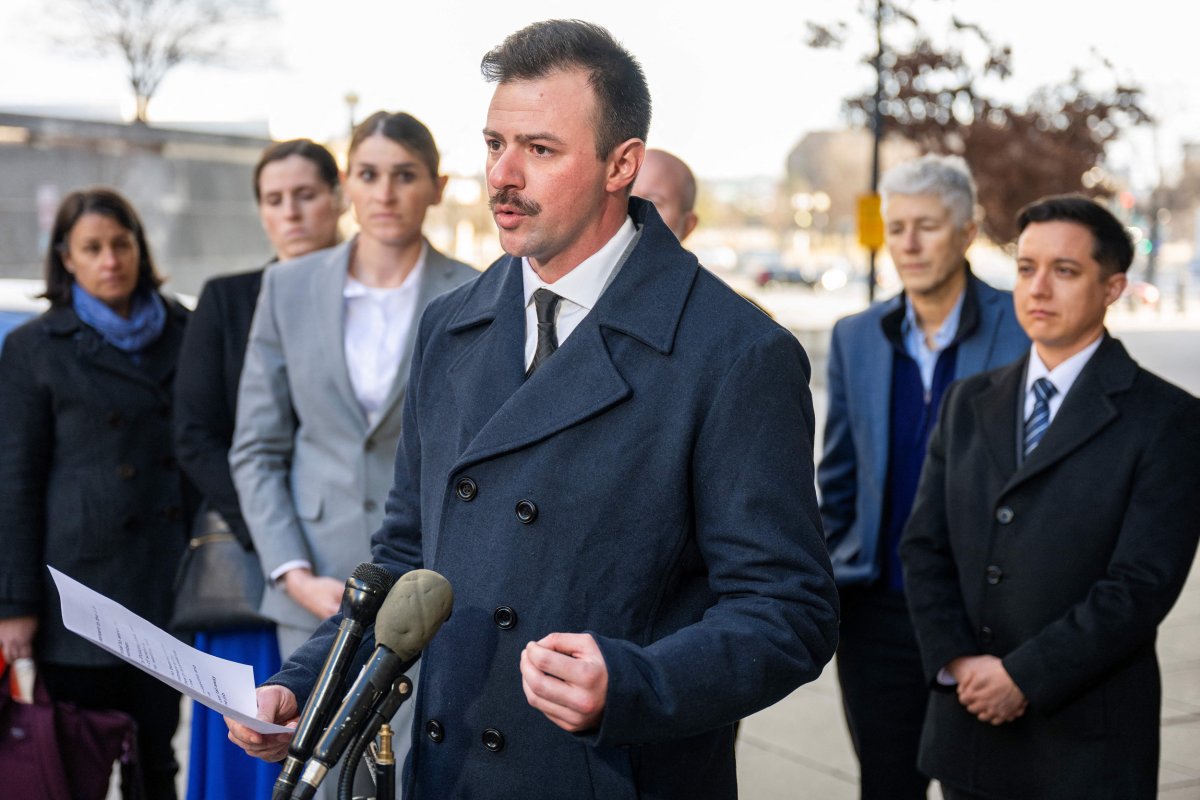Alivia Stehlik served active duty in the U.S. Army for nine years before transitioning. Now, the 17-year veteran who has been deployed worldwide may not have a military future.
Transgender service members of the U.S. Armed Forces continue to do their jobs as usual despite a new legal filing issued by the Pentagon on Wednesday that will essentially ban transgender troops within the next two months, barring legal challenges.
A spokesperson for the Pentagon told Newsweek: “At this time we’re letting the policy speak for itself.”
“My being trans has never been a factor,” Stehlik, 38, told Newsweek. “It’s about, do you show up and do you pull your weight? Are you decent people? Are you kind? Are you courteous? Are you easy to work with?”

Getty Images
Stehlik, who lives in Nashville, transitioned in 2017. Post-transition, she has been deployed to Afghanistan, Lebanon, United Arab Emirates and Jordan. The Army major and director of Holistic Health and Fitness for the 101st Airborne Division has sent teams to Turkmenistan, Kyrgyzstan, Israel and elsewhere.
“No change to business as usual, in terms of my treatment or my scope or responsibilities,” Stehlik said regarding the memo. “My team relies on me to do my part of the work in our division. We are constantly training to ensure the highest levels of readiness and that requires all of us doing our part. We are warfighters.
“I’m still focused on doing the job at hand. I swore to support and defend the Constitution of the United States of America, and that’s what I’m going to keep doing.”
The memo, issued one month after President Donald Trump signed an executive order that “prioritizes military excellence and readiness,” directs military branch heads to identify service members with gender dysphoria within 30 days and to “begin separation actions” within 30 days.
Trump’s executive order says that false gender identities “divergent from an individual’s sex cannot satisfy the rigorous standards necessary for military service.” It also says that transgender members are not “mentally and physically fit for duty.”
The disqualification would not only prevent transgender individuals from enlisting in the military but would also likely lead to the blanket termination of current transgender members who, like Stehlik, have dedicated their lives to defending the Constitution.
The memo outlines two exemptions: Transgender personnel wanting to enlist must prove they directly support “warfighting capabilities,” while existing members diagnosed with gender dysphoria must prove they support specific warfighting need and never transitioned to the gender in which they currently identify.
Second, members must also demonstrate “36 consecutive months of stability” in the member’s sex “without clinically significant distress or impairment in social, occupational, or other important areas of functioning.”
Current members who require medical care for transitions would also be affected.
Ban ‘Would Create Operational Gaps’
A Congressional Research Service paper from January 2024 referred to a 2016 RAND Corporation report, estimating that of the 1.3 million active-duty service members, 1,320 to 6,630 personnel serving in the active component and 830 to 4,160 in the selected reserve identified as transgender.
Logan Ireland is a transgender male who has served more than 14 years in the Air Force. His wife, Laila, is a transgender female and Army veteran who works as a Department of Defense civilian.
They live in Hawaii and met in 2012 when both were beginning their transitions.
Logan is an active-duty master sergeant who has completed multiple overseas tours in Afghanistan, Qatar, South Korea and the United Arab Emirates. He said he has supported multiple operations, including Operation Odyssey Dawn, Operation Enduring Freedom and Operation Freedom Sentinel. He has been rated top among his peers for multiple ranks.
“We’ve served openly and honorably in the military for nearly a decade,” Logan told Newsweek. “Thousands of transgender service members like me currently occupy critical roles, many requiring years of specialized training and expertise.
“Our service proves that we meet the warrior ethos and we’re not defined by our identity, but we’re defined by our merit, our competency, our character and our commitment.”
That’s included consistent deployments to different combat zones across the globe, “without any issue,” he added. About 73 percent of current transgender service members are senior noncommissioned officers with between 12 and 21 years of experience.
“Removing us would create significant operational gaps that could take over a decade to fill, undermining the readiness and effectiveness of the armed forces,” Logan said.

JIM WATSON/AFP via Getty Images
Laila served 12 years in the Army and is medically retired. She was deployed on missions for Operation Iraqi Freedom and Operation Enduring Freedom.
In 2012, she started LGBTQ military advocacy and for the past five years has served as membership director with SPARTA, a nonprofit started by transgender individuals that supports thousands of current and former transgender service members and their families.
Logan leads the SPARTA Future Warrior group, preparing prospective enlistees and those awaiting accession for their transition into military service.
“The arguments that that we’re hearing today echo those [about] the integration of African Americans in the 1940s, woman combat roles in the 1990s, and the repeal of ‘Don’t Ask, Don’t Tell’ in 2010,” Laila told Newsweek. “So, in every case, this rhetoric was proven wrong and the military emerged stronger from that.
“Military life is already challenging no matter your background or identity. Every person, every military family faces unique struggles. But the bond of service, sacrifice and resilience is what connects us. The families of trans service members share this same bond.”
Logan said his mission has remained the same since the executive order was issued. While he and Laila do not actively engage in ongoing litigation, both use their channels within groups like SPARTA to spread awareness.
Fellow service members on Logan’s leadership team “remain steadfast and supportive” of Logan and Laila, they added.
“No policy can erase the contributions of transgender Americans to history, warfare or military excellence,” Laila said. “Transgender service members embody a unique resilience and unwavering commitment to defending the Constitution, American values and its people, regardless of the challenges ahead.”
Rae Timberlake, a non-binary U.S. Navy lieutenant who enlisted at age 17 out of Michigan, told Newsweek they identified as queer at a young age. An original four-year plan turned into two decades.
“It was a very conscious decision on my part that I would have to kind of conceal part of my identity in order to pursue this career opportunity,” Timberlake said. “That seemed like a perfectly reasonable thing to do back then.”
Timberlake came out as non-binary in 2020 and began accessing gender-affirming care at the same time. They have been deployed on nuclear-powered aircraft carriers to the Western Pacific and Middle East, among other locations.
Now, they are making contingency plans and getting their finances in order to be prepared for what the coming weeks bring. A recent move to Maryland with their family was “preemptive” in case Timberlake’s job was lost.
“It will feel like a tremendous loss to leave the Navy,” Timberlake said. “I’ve done this for half my life so it’s all I really know. At the end of the day, I still have the skills and education and experiences the Navy invested in me, and I’ll hope to apply them toward helping people and making the world a better place.
“It’s hard to hear, but we have to recognize our own self-worth. Many are hopeful for legal relief, but I am only interested in serving a country that recognizes the patriotism and citizenship of anyone who volunteers to serve.”
They are communicating with countless trans service members who say they are “disappointed” in “disparaging” remarks made at the highest levels of federal government, despite long track records of service.
Timberlake continues to go to work and spend time with colleagues—performing “calm under pressure” like the Navy instructed them, even as “a roller coaster of emotions” cannot be avoided.
“What we do in the military, it transcends politics and it has to; we are charged with the safety and security of the United States, and the world at large,” Timberlake said. “It’s really important to not kind of get overcome by the politics of the moment.
“Administrations come and go, but the military—we are always here.”
Update 3/1/25 at 08:04 p.m. ET: This article has been updated with corrected information.

